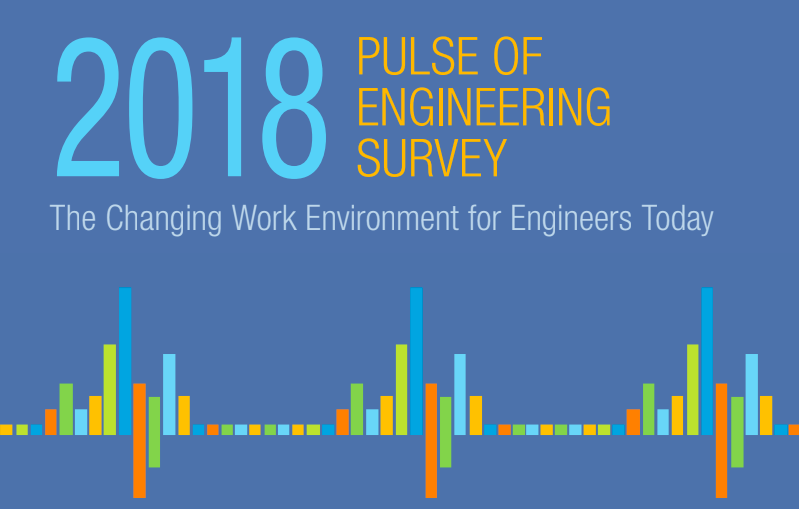The results of the fourth annual Pulse of Engineering Survey, conducted by IEEE GobalSpec, are available, providing insightful perspectives from the minds of engineers around the world on a variety of topics, from work environment to performance measurement, professional challenges and competition, and more.
Of the 2,236 survey respondents, taken from a pool of both Engineering360 and IEEE Spectrum registered users, 23% work at companies that employ ten or fewer engineers, 36% for companies employing 11–250 engineers, and 41% work for companies with more than 250 engineers. Respondents come from a wide range of industries including aerospace & defense, engineering/tech design services, communications (datacom/telecom/wireless/network), utilities/energy, and semiconductor and electronics components.
Key findings are below.

- Engineers are feeling pressure – 55% of engineers say the pace of engineering is increasing; 53% are required to do more with less; 40% say that pressure to meet deadlines is putting product quality/rework at risk. On average, engineers are working on four projects simultaneously, yet team size is not increasing. 73% percent said the average size of the teams they work on has decreased or stayed the same. The majority also say that designs are becoming more sophisticated/complex and that design cycles are shrinking, while time-to-market pressures are increasing. To help alleviate these pressures, 44% of companies have increased design involvement from external partners and vendors.
- Interest in information remains high despite being underwhelmed with what’s available – Engineers report that they have an interest in learning new programming languages, software development and artificial intelligence implementation in order to advance in their careers. Only 18% say they’re overwhelmed with information, noting that the leading tools to help complete projects are technical documentation, software and development tools, product specifications and datasheets. This not only applies to the quantity of information, but also the level of technicality and detail as well.
- It’s difficult to protect and grow institutional knowledge – 61% say that knowledge and/or information loss as employees left the company was very or extremely important, a 16% increase over a year ago. Yet only 30% of companies have formal practices in place to identify senior-level and specialized experts to train, transfer, mentor, manage or retain their knowledge among others in the organization.
- Changing tech and increasing competition presents challenges – 52% said the number of competitors is growing and 66% said the competitive landscape is global and competes 24/7. Technological advances create additional challenges, as 49% say new technologies and companies disrupt their products/markets faster and 54% said that their company’s technologies were relevant for a shorter period of time.
- Engineers are loyal to their profession, less so to their company – 87% say interesting work/projects are the most important factor in their career. Only 37% say they are very or completely likely to be employed at the same company five years from now. Top reasons for moving on from a current role are to move to a different company, retirement or promotion to a senior role.
 Solving Information and Knowledge Shortages
Solving Information and Knowledge Shortages
One of the most effective ways engineers can maintain and advance their professional skills is through online training courses. Knowing how and where to give your engineering staff the resources and support they need is easy with the IEEE eLearning Library.
Researchers can use the IEEE eLearning Library to easily stay abreast of the latest developments in related technologies, creating greater synergy with other product and R&D teams and enabling your team to take advantage of greater market opportunities.
For complete survey results, download the report.
Resources
(12 Jul 2018). IEEE GlobalSpec Announces Fourth Annual Pulse of Engineering Survey. Pr Newswire.



[…] Today’s engineers are always looking to improve through educational opportunities and advanced degrees. Licensed engineers are also required to stay up to date on the latest innovations and how they change the industry in order to maintain their various licenses. […]
[…] finite element method (FEM) was independently developed by engineers, beginning in the mid-1950s, to address structural mechanics problems related to aerospace and […]